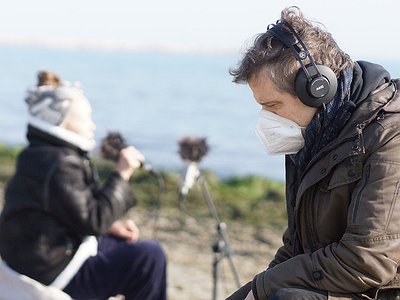Name: Ian Brennan
Nationality: American
Occupation: Producer, writer, educator
Current release: Sainkho Namtchylak new album where water meets water: bird songs and lullabies, produced by Ian Brennan, is out via Ponderosa.
Recommendations:
1. The Finnish film, The Blind Man Who Did Not Want to See Titantic.
2. The poetry of Raymond Antrobus.
[Read our Sainkho Namtchylak interview]
If you enjoyed this Ian Brennan interview and would like to know more about his work, visit his official website.
Over the course of his career, Ian has worked with a wide range of artists, including Flea, Tinariwen, Lucinda Williams, David Hidalgo (Los Lobos), and Nels Cline (Wilco).
[Read our Nels Cline interview]
When I listen to music, I see shapes, objects and colours. What happens in your body when you're listening? Do you listen with your eyes open or closed?
Listening with eyes closed is the ultimate rebellion against the visual world dominating the aural.
What were your very first steps in music like - and how do you rate gains made through experience versus the naiveté of those first steps?
The goal is always to try to recapture that first freedom before judgment reared its ugly head.
According to scientific studies, we make our deepest and most incisive musical experiences between the ages of 13-16. What did music meant to you at that age and what’s changed since then?
Music was my life-jacket to survive adolescence.
But as I have aged, I listen to very little music that is performed and instead try to hear the random music that surrounds us always.
Over the course of your development, what have been your most important instruments and tools and how have they shaped your perspective on music?
Empathy.
What, would you say, are the key ideas behind your approach to music and what motivates you to create?
Intimacy is the goal.
Sadly, much commercial music erases traces of its own humanity in place of presenting a polished product.
Paul Simon said “the way that I listen to my own records is not for the chords or the lyrics - my first impression is of the overall sound.” What's your own take on that and how would you define your personal sound?
The quest is to record sounds that I’ve never heard before (and not rest on the laurels of genres or technique).
Sound, song, and rhythm are all around us, from animal noises to the waves of the ocean. What, if any, are some of the most moving experiences you've had with these non-human-made sounds? In how far would you describe them as “musical”?
Our ears are especially tuned to hear the frequencies of water, which is another indicator of just how vital water is for survival.
The primary accompanying instrument on this album is water and Sainkho responding to those tides.
From very deep/high/loud/quiet sounds to very long/short/simple/complex compositions - are there extremes in music you feel drawn to and what response do they elicit?
I tend to favor minimal and short pieces of art— cutting out the excess as much as possible.
But ultimately what matters is not how something was created, but the feeling it evokes.
From symphonies and traditional verse/chorus-songs to linear techno tracks and free jazz, there are myriads ways to structure a piece of music. Which approaches work best for you – and why?
I like pieces that take a journey, but leave breadcrumbs along the way to help us orient ourselves.
Could you describe your creative process on the basis of one of your pieces, live performances or albums that's particularly dear to you, please?
My favorite moments are recordings of improvised songs that emerge as a complete thought.
Almost all of Sainkho’s new album where water meets water: bird songs and lullabies is that. You are hearing recordings of songs being created.
Sometimes, science and art converge in unexpected ways. Do you conduct “experiments” or make use of scientific insights when you're making music?
Music is medicinal. Seeing people have their body loosened and their consciousness altered by song is magical.
How does the way you make music reflect the way you live your life? Can we learn lessons about life by understanding music on a deeper level?
To try to be as direct and honest, but empathic as possible.
Do you feel as though writing or performing a piece of music is inherently different from something like making a great cup of coffee? What do you express through music that you couldn't or wouldn't in more 'mundane' tasks?
Hopefully, we live musically. Some of the most musical people I have ever met are not musicians.
The difference with recording is to capture and structure that life in a more permanent form.
Every time I listen to "Albedo 0.39" by Vangelis, I choke up. But the lyrics are made up of nothing but numbers and values. Do you, too, have a song or piece of music that affects you in a way that you can't explain?
Most of my recordings are with people singing in languages I do not know.
Invariably, what I have found in translation is that the moments where they become the most musical are those that are most imbued with meaning. What they are communicating is conveyed even if the literal meaning is not explicitly understood.
If you could make a wish for the future – what are developments in music you would like to see and hear?
That more music would be made unconditionally and privately.
That people would play music purely for the purpose of tuning themselves emotionally and not for any external attention or reward.




